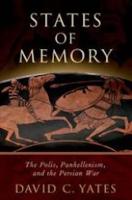
OUP (2019) h/b 360 pp £55.00 (ISBN 9780190673543)
Modern students of the classical world are familiar with the Persian Wars, invasions of Greece’s mainland under Darius and Xerxes in 490 and 480/79 BC respectively, and with their causes, rooted firmly in the Ionian Revolt of 499 to 493. Yet, as Y. argues persuasively in this compelling monograph, in the century following the wars few Greek states (except, perhaps, Athens) would have wholeheartedly agreed with the narrative as we know it.
From the very start arguments raged about how these seismic events should be memorialized, as the immediate reaction to the inscription engraved on the bronze Serpent Column at Delphi by Pausanias, the Spartan Regent, commander of the allied forces at Plataea, demonstrates: the Spartans erased his original wording, ‘When the leader of the Greeks destroyed the army of the Persians, / He, Pausanias, dedicated this monument to Apollo’. While their objections lay partly in Pausanias’ self-aggrandizement, their replacement (a list headed by ‘the Spartans’ of the thirty one allied states credited with defeating the Persians) serves to emphasize the role played by individual poleis and removes any hint of a panhellenic alliance. At the same time it raises important questions: which states deserved mention? Certainly not those previously Medizing Ionians who had nonetheless contributed to the allied victory at Mycale.
For Y. the Serpent Monument encapsulates wider tensions, not least between states such as Athens and Plataea (devastated by the Persians) and those Peloponnesians whose lands and buildings had remained untouched. Thus while Corinth recalled how its women prayed successfully for salvation to its patron goddess, Aphrodite, Athens positively fetishized the blackened ruins of its temples, whose destruction became both a badge of honour and a spur for vengeance.
Individual states disagreed vehemently, too, about the scale of the war (Y. deliberately uses the singular) in terms of both duration and location. While it was convenient for Sparta to think of a mainland conflict bookended by Thermopylae and Plataea (when Spartan generals led the allied states), Athenians naturally preferred to make much not only of their victory at Marathon but of campaigns waged by the Delian League under their command, including the Battle of Eurymedon and ending (perhaps) with the Peace of Callias. It was only with Philip II and Alexander III of Macedon that an authorized version of the Persian Wars emerged. After the Battle of Chaeronea put an end to the polis system, it was in the Macedonians’ interest to rally Greece by reimagining the wars as a panhellenic endeavour (albeit favouring a largely Athenian version of events) that would end only when Alexander took the throne of Persia. Even now, however, this narrative was not universally accepted, and it was left to his successors to hone the canonical interpretation that we know today.
That this nonetheless should chime so well with the earliest literary record we possess, the Histories of Herodotus, is in part a mark of that writer’s genius. Yet, while that work, as Y. observes, ‘provides a valuable impression of the polyphony that would have defined the overall Persian-War tradition in the classical period … [it] does not restore to those voices the cohesiveness, dynamism, and independence that would have characterized them within the memorial communities that sustained them.’ The present book, however, does.
Using literary sources and inscriptions as well as considerations of monuments and rituals, all underpinned by thorough footnotes and a comprehensive bibliography, Y. steers the reader deftly through the many ancient ways of seeing the Persian Wars. He reveals a kaleidoscope of viewpoints that shift according to political expediency, and reminds us that even historical events about which we think we know so much, far from being written in stone (or inscribed in bronze), have come down to us thanks to selective memories and deliberate distortions. For any serious student of the Persian War(s) this should be standard reading.
David Stuttard
